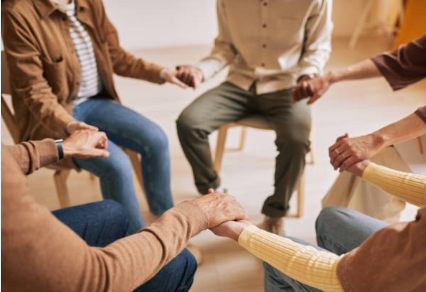Are Self-Help Groups Good?
If you’ve ever wondered whether self-help groups can be helpful, you’re not alone. There is a growing body of evidence that suggests these community groups can have positive effects on depression, addiction, and mental health. Read on to learn about their benefits. These groups are an excellent resource for finding support and community from your peers.

Selfpause Affirmation App
Download the app to get 1,000’s of affirmation meditations and everything you need to write, record and listen to your own.
Positive effects of self-help groups on mental health

Self-help groups offer a wide range of benefits, from peer support to increased self-esteem. Participants also experience a sense of belonging in a nonjudgmental environment. Members can openly discuss problems and concerns. Group members are encouraged to share their own experiences and learn from those of others. These groups are not a replacement for professional therapy or counseling, but they can work alongside it.
One of the most important benefits of self-help groups is the ability to discuss personal experiences with peers who have faced similar challenges. This unique approach gives members a new perspective on old problems. Other group members can provide feedback and ideas that have proven effective in overcoming their own issues. Furthermore, members can learn from each other’s experiences and provide each other with practical and emotional support.
Another benefit of self-help groups is that they are a great mental health resource. Oftentimes, mental health professionals will recommend self-help groups to patients who are struggling with a problem. Unlike traditional therapy, self-help groups focus on improving one’s life rather than reversing mental illness. They can focus on general wellbeing, such as coping with stress and anxiety, or address specific issues such as addiction.
Another benefit of self-help groups is that they build community support networks. By joining a self-help group, a person gains a sense of belonging. This type of support also makes it easier to overcome difficulties associated with mental illness, including eating disorders and other physical conditions.
Self-help groups have become increasingly popular in the last four decades. They are a valuable resource for mental health service users and their families. Research in high-income countries suggests that participation in these groups reduces the need for inpatient mental care and improves social functioning. It has also been shown that SHGs help families become valued contributors to the treatment process.
The positive effects of self-help groups on mental health have been studied extensively for a variety of conditions, including depression. In a meta-analysis of nine RCTs, peer support groups were shown to reduce depressive symptoms significantly in comparison with the control group and traditional treatment. Moreover, they are significantly cheaper than traditional therapy.
There are two types of self-help groups: peer-led groups and professional-led groups. The former is facilitated by professionals and experts, while the latter is run by nonprofessionals. Some examples of self-help groups are Alcoholics Anonymous, Cancer Support Group, and other self-help groups. All of these groups are designed to help individuals develop skills to deal with the effects of their conditions.
The mutual nature of self-help groups helps participants share their personal stories with each other. The 12-step program, for example, is a form of self-help group, which focuses on recovery from substance use. Individuals in the 12-step program usually meet weekly or biweekly to exchange experiences.
Positive effects of self-help groups on depression

There is a growing body of research examining the positive effects of self-help groups on depression. Many studies report significant reductions in depressive symptoms after attending such groups. However, it is important to know how these groups are conducted and whether they should be professionally led. Ideally, the groups should be organized so that the participants determine the majority of topics and content.
One of the main benefits of self-help groups is that they offer a safe place to talk. Group members are willing to listen and encourage open communication, which can help people overcome their problems. In addition, because the sessions are voluntary, people can open up and share their experiences without fear of judgment. This can create a deeper connection with others and reduce overall stress.
However, there were some barriers to participating in the group. Some participants feared that their depression would worsen if they participated in the groups. Others were worried that they would make others in the group feel worse by sharing their own difficulties. This may have been a result of emotional avoidance or negative beliefs about seeking help.
In addition, these groups can help people quit harmful habits. They can also help people organize their goals. This can be a useful alternative to support groups, therapy, and workbooks. Self-help groups are groups of people who share the same problems. This means that they can offer each other support if they need it.
The authors concluded that OSGs could improve depression outcomes by reducing depressive symptoms. However, they found that engagement in the groups was low, possibly because of the barriers that people experience. This suggests that OSGs could reduce depression symptoms, but further research is needed to determine how best to design them for maximum benefit.
While it is important to keep in mind that there are still concerns about the group approach, the positive effects of such groups are still compelling. Researchers who have studied this approach believe that in the future, self-help groups may become the treatment of choice for the majority of Americans. While self-help groups are not a cure for depression, they are still a valuable way to help people deal with their problems. In addition to improving the lives of people who seek help, these groups also help people to overcome the stigma and isolation that often accompany depression.
In addition to improving self-esteem, self-help groups can help people overcome major health and emotional challenges. These groups can also help people cope with grief. They are a great way to help those who are struggling with the emotional and physical problems of depression. Self-help groups are also an excellent source of support for people who cannot attend in-person groups.
Our Top FAQ's
Self-help groups are gatherings of people who come together to support and encourage one another in addressing a common problem or challenge. These groups are often organized around a specific topic, such as addiction, mental health issues, or a chronic illness, and may be led by a trained facilitator or by group members themselves. Self-help groups can take many forms, including in-person meetings, online forums, or support groups through social media.
Self-help groups can offer a number of benefits to those who participate. These may include:
-
A sense of community and belonging: Self-help groups provide a space where individuals can connect with others who are facing similar challenges and can offer mutual support and understanding.
-
Emotional support: Sharing experiences and feelings with others who have gone through similar experiences can be therapeutic and help people feel less alone.
-
Practical advice and coping strategies: Group members may offer suggestions and strategies for dealing with a particular challenge, which can be helpful for those seeking solutions or looking for ways to improve their situation.
-
Increased self-awareness: Talking about one’s experiences in a self-help group can help people gain a better understanding of themselves and their motivations.
Self-help groups can be an effective form of support for many people, and research suggests that they can be particularly beneficial for those struggling with mental health issues or addiction. However, self-help groups are not a substitute for professional treatment, and it is important for individuals to seek appropriate medical or mental health care when needed.
While self-help groups can be a helpful resource for many people, there are also some potential drawbacks or limitations to consider. These may include:
-
Lack of structure: Some self-help groups may not be well-organized or may not have a clear set of goals or objectives.
-
Lack of confidentiality: Self-help groups are often informal and may not have strict confidentiality policies, which can be a concern for some people.
-
Limited expertise: Group members may not have the necessary training or expertise to provide accurate or appropriate advice or support.
Deciding whether to join a self-help group is a personal decision that depends on an individual’s needs and goals. Some things to consider when deciding whether a self-help group might be helpful include:
-
The type of support needed: Self-help groups can be a good choice for those seeking emotional support or practical advice from others who have faced similar challenges.
-
The availability of other resources: For those who need more structured or intensive support, a self-help group may not be the best choice. In these cases, seeking help from a mental health professional or other qualified provider may be more appropriate.
-
Personal preferences: Some people may find self-help groups to be a helpful and supportive resource, while others may prefer more individualized forms of support. It is important to consider what feels most comfortable and effective for the individual.
